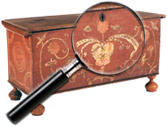|
|
Eighteenth Century French Furniture
The story of eighteenth century French furniture is the story of the rise, immense popularity and precipitous fall of the Rococo/Louis XV style. Louis XIV, the “Sun King”, who reigned in the previous century, set the stage for this proliferation of sumptuous furnishings when he established the Manufacture Royale de Gobelins as a unified center for furniture and tapestry workers, drawing craftsmen from across Europe with the limitless opportunities associated [...] Click here to continue reading.
Samuel Fiske (1769-1797)
Born in Waltham, Massachusetts, Samuel Fiske worked as a cabinetmaker in Dorchester with Stephen Badlam. Fiske had his own shop in Salem, probably beginning in the 1780s, and was in Boston on Washington Street by the 1790s. Known items include a Hepplewhite mahogany card table signed in chalk, “S. Fisk/Cabinate Maker/Bofton” and Hepplewhite shield-back side chairs branded “S.F.”
(Source: William C. Ketchum, Jr., American Cabinetmakers: Marked American Furniture, 1640-1940)
Wharton Harrris Esherick (1887-1970)
Living in a remote area by Valley Forge near Philadelphia, Wharton Esherick built his homestead and work place in the 1920s and left a legacy of bridging art with craftsmanship. Many of his works reflect the Art Deco style, and his distinctive furniture designs made him a pioneer of the decorative arts. He had little use for straight lines, and his structures are full of swirls and spirals, with an [...] Click here to continue reading.
Smith Ely (American, 1800 to 1884)
Smith Ely was a turner, chair maker, and merchant whose shop was at Broad and New Streets in New York, ca 1823-1837. He also sold undecorated chairs to other manufacturers who then decorated and sold them. See Monkhouse and Michie, The Magazine Antiques, June 1982.
Information courtesy of Cowan’s Auctions Inc.
The Edo Period
The Japanese Edo period is also known as the Tokugawa period. It is a division of Japanese history running from 1603 to 1867. The period marks the governance of the Edo or Tokugawa Shogunate which was officially established in 1603 by the first Edo shogun Tokugawa Ieyasu. The period ended with the Meiji Restoration, the restoration of imperial rule by the 15th and last shogun Tokugawa Yoshinobu. The Edo period is [...] Click here to continue reading.
D. R. Dimes & Co.
Early in 1960, Douglas R. Dimes became fascinated with the furniture designs of 18th century craftsmen, so he studied period furniture in museums and books, and with no experience and few tools, he began to make Windsor chairs. He made and sold chairs for 14 years before leaving his full time job in 1976 to form and incorporate his present company in New Hampshire. Thomas Lavigne, now Vice-President and [...] Click here to continue reading.
John DeWitt
John DeWitt worked in New York City from 1794 to 1799. The Windsor Style in America by Charles Santore lists DeWitt’s working at 38 Whitehall Street, 225 William Street, 47 Water Street and 442 Pearl Street. The book also notes that DeWitt “made Windsors for the Senate and Assembly rooms, Federal Hall, New York City.”
Most of DeWitt’s output involved Windsor bow-back side chairs and continuous-arm chairs, including brace-backs, according to American [...] Click here to continue reading.
Campeche or Campeachy Chairs
In this country Campeche chairs are associated with New Orleans and the West Indies in general. The chairs feature an X-form leg and stretcher, one leg of which extends up to form a curved stile for the back, the other forming the seat rail, between these extensions is attach a leather ‘sling’ – often goatskin – which forms the seat and back – the equivalent of a contemporary lounge chair.
[...] Click here to continue reading.
Ralph Eugene Cahoon Jr.(1910-1982)
Ralph Eugene Cahoon Jr. was born in Chatham on Cape Cod in 1910. He grew up close to the harbor and enjoyed fishing, clamming and scalloping. Sketching was a favorite pastime for young Ralph, and his drawings were a regular feature in his high school newspaper. He also took a correspondence course in cartooning while still in high school.
After working two years at odd jobs to raise money for [...] Click here to continue reading.
Martha Farham Cahoon (1905-1999)
Martha was originally from the Rosindale section of Boston, born to Swedish immigrants in 1905. Her father, Axel Farham, was a talented furniture decorator who learned his art in his native Sweden. He worked for some of the best-known decorating firms in Boston. When Martha was 10 years old, the family moved to the Cape Cod town of Harwich. She excelled in school, but chose to apprentice with her [...] Click here to continue reading.
|
Recent Articles
- Charles Alfred Meurer – American Artist & Tromp L’Oeil Artist
- Sendak, Maurice – American Artist & Writer
- Godie, Lee – American Artist
- Davis, Vestie – American Artist
- Bartlett, Morton – American Artist
- Mackintosh, Dwight – American Artist
- Evans, Minnie Jones – African-American Artist
- Mumma, Ed (Mr. Eddy) – American Artist
- Nice, Don – American Artist
- Savitsky, John (Jack) – American Artist
- Gordon, Harold Theodore (Ted) – American Artist
- Dial, Thornton – African-American Artist
- Doyle Sam – American Artist
- Johnson, Lester Frederick – American Artist
- Finster, Howard – American Artist
|
|
